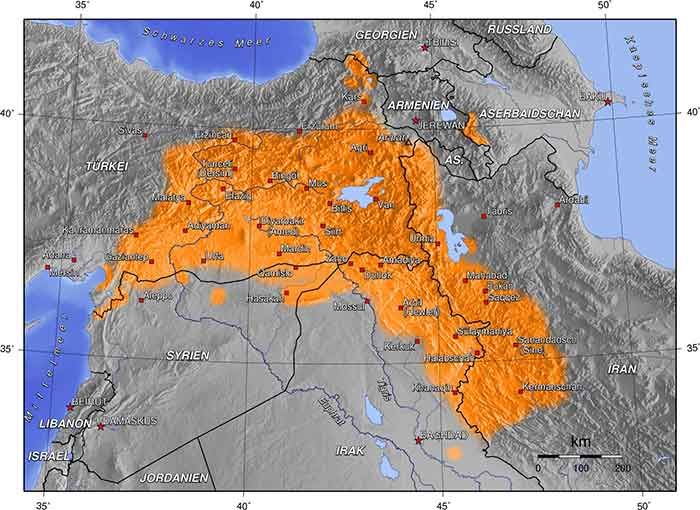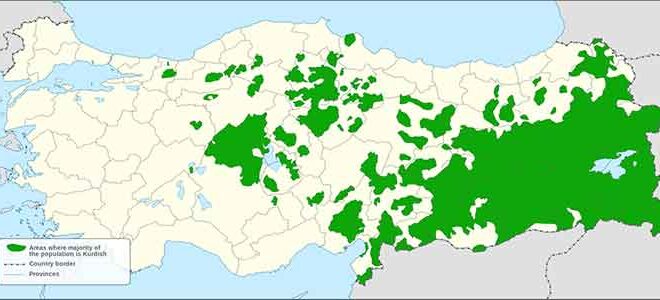A recent blast hit the center of Istanbul resulting in several casualties. The Turkish authorities were very quick to announce the identity of the suicide person: A Kurdish woman in close relation with the Kurdistan Workers Party. Nevertheless, this terror act in Istanbul, followed by a new Turkish military intervention (aggression) in North Syria, once again opened the “Kurdish Question” which is in direct connection with the question of Kurdistan’s independence and terrorism as the political instrument in the realization of the national projects and ultimate goals.
The role of Russia in solving the “Kurdish Question” in the Middle East can be of crucial importance and a double-fold nature: 1. To openly support minority rights of the Kurds for self-determination including and a right for the national-state independence according to, for instance, the US’s policy-pattern upon Kosovo case; and 2. To provide by all means hidden support to the Kurdish freedom-struggle terrorism in Turkey as a matter of revenge for both Turkey’s direct support of the Chechen separatist rebels in the 1990s on Russia’s territory and for the Turkish bastard-style crashing the Russian military plane in 2015.
The Kurds are mostly discriminated against and oppressed in Turkey in comparison with all present-day states of their residence. The Kurds have not recognized in Turkey as a separate ethnolinguistic minority with their own language and culture regardless of the fact that they compose one-fifth of total Turkey’s inhabitants and being together with the Greeks and the Armenians the oldest population in Turkey living in Anatolia almost 3.000 years before the first (Seljuk) Turks came there at the end of the 11th century.
There are three fundamental specific reasons for the current Kurdish separatist movement in Turkey out of the common Kurdish wish and right to have their own national state as one of the oldest ethnolinguistic people in both the region of the Middle East and the world:
Visible economic underdevelopment of the Kurdish eastern part of Turkey compared with the rest of the country as a result of asymmetric economic and development policy by Ankara.
Stubborn reluctance of any kind of the Turkish government to recognize the Kurdish separate existence as the ethnic group of its own specific language and culture as a result of the Ottoman/Turkish assimilation policy of all Muslim inhabitants of the country.
The Turkish rejection to recognize a minority status of the Kurds by granting a national-cultural or political autonomous status for Turkey’s Kurdistan that is a consequence of the continuation of Ankara’s unlawful administration of part of ethnographic Kurdistan as such autonomy was internationally recognized by the Peace Treaty of Sèvres in 1920.Ankara’s discrimination and oppressive anti-Kurdish policy led finally to the establishment of the Kurdistan Workers’ Party (PKK) in 1978 for the sake to fight for unrecognized Kurdish minority rights using guerrilla warfare as means to achieve its proclaimed national-political goals. Ankara from its point of political view declared the PKK as both an illegal and terrorist organization fighting for the destruction of the legal and institutional system of the country which is true from a very technical viewpoint as it was also true that the Kosovo Liberation Army (the KLA) was doing the same with Serbia’s legal and security system in the 1990s but in this case politically and morally supported by Ankara. Undoubtedly, the PKK committed numerous terrorist actions across Turkey in which, according to official governmental sources, around 6.000 people were killed only during the first decade of the PKK activity. The limited fruits of such PKK tactics finally came as Ankara was forced to recognize at least formally the Kurdish cultural distinctiveness if not ethnic and linguistic ones. However, here the crucial question is: How it is possible to have a separate culture without а separate language and even ethnicity? It is a widespread approach that basically separates ethnolinguistic features to create and separate cultural identity as ethnolinguistic and cultural identities are usually understood as synonyms but this formula does not work in Turkey in the case of the Kurds and several other (unrecognized) ethnolinguistic minorities.
Anyway, the PKK’s requirement for either territorial-political autonomy or independence of Kurdistan is unacceptable for Ankara. Subsequently, from the mid-1980s Turkey is directly faced with its own “Kosovo syndrome”. The Turkish authorities reciprocally answered to the PKK’s brutal warfare through the also brutal treatment of the Kurdish civilians in the war zones in East Turkey. Hundreds of PKK activists are imprisoned and tortured each year by the Turkish state security forces which succeeded in 1999 (a year of NATO’s military intervention against the Federal Republic of Yugoslavia declaratively for the sake to prevent state terrorism over Kosovo Albanian civilians) in arresting the PKK’s leader Abdullah Öcalan (known as Apo) who became under the mockery trial sentenced to death with the state brutality against the Kurds continued. Nevertheless, only due to the direct pressure by the EU’s Commission in 2002 the pressure against the Kurds became to a certain extent eased as Turkey as a candidate state for the EU’s membership was obliged to adopt new liberal laws by which the Kurds were granted with the rights to maintain their own culture followed by the protection against arbitrary imprisonments and politically colored court investigations. In one word, in order to become the EU’s member state, one of the requirements is to grant every citizen the right to cultural expression, including Turkey’s main minority people, the Kurds, whose aspirations had long been suppressed in pursuit of nation-building goals by successive Turkish governments.

The Kurdish desire to establish Kurdistan as an independent state is opposed by all governments of the current states in which the Kurds live. In the region, especially Turkey is a country that undoubtedly suffered from different aspects of terrorism-related activities and different types of political violence. A long-standing separatist conflict in Turkey caused thousands of lives and imposed state terrorism or “terrorism from above” by Ankara against its own citizens in East Anatolia including martial law in the 1980s. A similar situation was in Iraq during the time of Saddam Hussein. That was and in Turkey still, is a clash between two levels of terrorism: state terrorism vs. sub-state terrorism. Both sides were and are making war crimes, executions, torture, and destruction of material property but the reactions by the West, especially by the US administration, are of a double standard nature as accusing only the Kurdish side of terrorism (the PKK) but not and the Turkish government. However, for the matter of comparison, during the Kosovo Crisis in 1998−1999 both the West and the US saw the terror acts carried out only by Serbia’s government but not by the KLA – a typical terrorist organization as a replica of the PKK, the IRA, the ETA or the Hezbollah. Nevertheless, the most “strange” thing is that Ankara never saw the KLA as a terrorist group or organization and opened in such a way the doors for the moral legalization of the PKK as the freedom fighters’ political-revolutionary party. Ankara made an even more serious precedent by recognizing the independence of Kosovo in 2008 – the state that is governed by ex-MLA’s commanders (as the US’s clients). Subsequently, there is no one reason not to recognize the independent Kurdistan governed by the PKK’s commanders with Abdullah Öcalan as the President (as Hashim Tachi – a commander of the KLA in the 1990s, became a President of the Republic of Kosovo in 2016).
A similar state terrorism policy emerged in Saddam’s Iraq as he time to time enacted oppression of the aboriginal Kurds like it was the case with the “al-Anfal Operation” that was carried out in 1982 (during the Iraqi-Iranian War of 1980−1988) when approximately 8.000 Kurds were arrested and executed. The most brutal military action against the Iraqi Kurds was done in 1988 when the army of Saddam Hussein used chemical weapons and destroyed more than 2.000 Kurdish villages but at that time without any US sanctions as Saddam was at that time an ally of Washington in the US’s struggle against the (Shia) Islamic Republic of Iran regardless the fact that the estimations of the killed ethnic Kurds in this organized genocide range up to 200.000.
Turkey’s policy upon the “Kosovo Question” is already returned as the boomerang to the Turkish home and is going most probably to be solved according to the Kosovo pattern. The role of Russia in solving the “Kurdish Question” in the Middle East is expected to be fundamental concerning primarily Turkey’s Kurdistan at least as a pure matter of a “boomerang revenge policy” for NATO’s/Turkey’s Kosovo strategy.
 Eurasia Press & News
Eurasia Press & News




